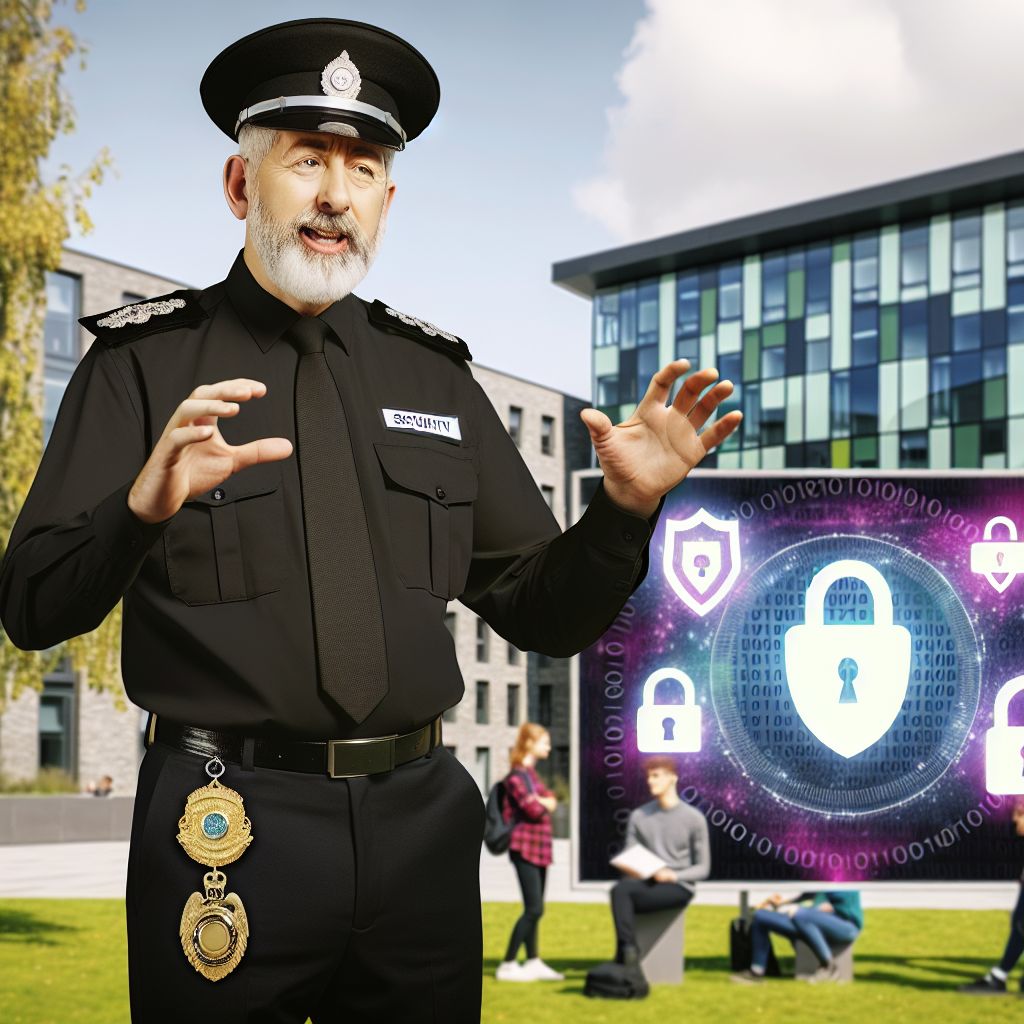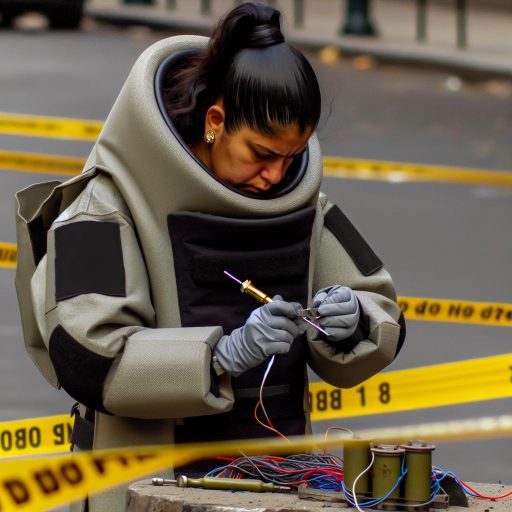Introduction:
It is crucial for college campuses to prioritize cybersecurity awareness to protect sensitive information and prevent cyber attacks.
Campus Security Officers play a vital role in promoting cybersecurity awareness among students, faculty, and staff.
As technology continues to advance, cyber threats become more sophisticated, making it essential for educational institutions to educate their community members about potential risks.
With the increase in online learning platforms and digital resources, college campuses are more vulnerable to cyber attacks than ever before.
Campus Security Officers are on the front lines of defense, actively engaging with students and staff to raise awareness about cybersecurity best practices.
They conduct training sessions, workshops, and awareness campaigns to educate the campus community on how to recognize and respond to cyber threats.
By working closely with IT departments and other campus stakeholders, Campus Security Officers are able to stay informed about the latest cyber threats and security measures.
They can then effectively communicate this information to the campus community, empowering them to protect their personal and professional data.
Campus Security Officers play a critical role in fostering a culture of cybersecurity awareness on college campuses.
Their proactive approach to educating and engaging with students, faculty, and staff is essential in mitigating cyber risks and safeguarding the institution’s digital assets.
Responsibilities of Campus Security Officers:
Campus security officers play a crucial role in maintaining safety and security on campus grounds.
They are responsible for various tasks that contribute to the overall security of the campus environment.
Some of their key responsibilities include:
- Patrol campus to ensure physical security.
- Monitor security cameras and alarms.
- Respond to security incidents.
One of the primary responsibilities of campus security officers is to patrol the campus grounds regularly to ensure physical security.
By being visible and actively monitoring the area, security officers can deter potential threats and respond quickly to any security breaches.
Campus security officers are tasked with monitoring security cameras and alarms to identify any suspicious activities or security breaches.
By keeping a close eye on surveillance footage and alarm systems, officers can act swiftly to address security incidents before they escalate.
In the event of a security incident, campus security officers must respond promptly and effectively to mitigate risks and ensure the safety of students, faculty, and staff.
This may involve coordinating with law enforcement, conducting investigations, and providing support to those affected by the incident.
Campus security officers play a vital role in maintaining a safe and secure campus environment.
Transform Your Career Today
Unlock a personalized career strategy that drives real results. Get tailored advice and a roadmap designed just for you.
Start NowTheir responsibilities encompass a wide range of tasks that are essential for ensuring the well-being of everyone on campus.
Collaboration with IT department:
Campus security officers work closely with IT professionals to identify and address cybersecurity threats.
They assist in investigating security breaches and implementing security measures to prevent future occurrences.
By collaborating with the IT department, security officers can stay informed about the latest cybersecurity trends and best practices.
This partnership ensures a proactive approach to cybersecurity, rather than a reactive one.
Security officers can provide valuable insights from a physical security standpoint that IT professionals may not have considered.
Working together, they can create a comprehensive security strategy that addresses both physical and digital threats.
Regular communication and collaboration between the two departments are essential to maintaining a strong cybersecurity posture.
Security officers can also help educate IT staff on the importance of physical security measures in protecting digital assets.
By sharing knowledge and resources, the IT department and security officers can create a more robust defense against cyber threats.
Ultimately, a united front between campus security officers and IT professionals is crucial in ensuring the overall safety and security of the campus community.
Uncover the Details: Benefits and Perks of Being a Deputy Sheriff
Training and education initiatives:
- Conduct cybersecurity awareness training sessions for students, faculty, and staff.
- Distribute educational materials on cybersecurity best practices to all members of the campus community.
- Promote a culture of cyber hygiene on campus by emphasizing the importance of secure online practices.
Training and education initiatives play a crucial role in raising awareness about cybersecurity among campus community members.
With the increasing number of cyber threats targeting educational institutions, it is essential for campus security officers to actively engage in educating students, faculty, and staff about potential risks and best practices for staying safe online.
Implementing regular training sessions and distributing educational materials can help empower individuals to protect themselves and the campus network from cyber attacks.
Conduct cybersecurity awareness training sessions:
One effective way for campus security officers to enhance cybersecurity awareness is by conducting training sessions for students, faculty, and staff.
These sessions can cover a range of topics, including recognizing phishing attempts, creating secure passwords, and identifying potential threats.
By educating members of the campus community about common cyber risks and best practices, security officers can help reduce the likelihood of successful cyber attacks.
Distribute educational materials:
In addition to training sessions, distributing educational materials on cybersecurity best practices is another valuable initiative.
Showcase Your Business Today
Reach thousands of readers actively exploring professional services. Publish your business profile and grow your audience now.
Publish NowCampus security officers can provide brochures, posters, and online resources that offer practical tips for staying safe online.
By making these materials readily available to students, faculty, and staff, security officers can reinforce the importance of cyber hygiene and encourage proactive measures to protect sensitive information.
Promote a culture of cyber hygiene:
Creating a culture of cyber hygiene on campus involves instilling a mindset of vigilance and responsibility when it comes to online security.
Campus security officers can promote this culture by encouraging individuals to regularly update software, use strong passwords, and avoid clicking on suspicious links.
By fostering a community that prioritizes cybersecurity, security officers can help mitigate the risk of cyber threats and safeguard the integrity of the campus network.
Delve into the Subject: Mental Health Resources for ICE Agents
Incident response and reporting:
- Respond to cybersecurity incidents and assist in resolving them
- Report security breaches to appropriate authorities
- Implement protocols for handling data breaches
As a campus security officer, one of the crucial roles you play in cybersecurity awareness is incident response and reporting.
In this aspect, your responsibilities include promptly responding to cybersecurity incidents and supporting in their resolution.
This means being the first line of defense when a security breach occurs, whether it’s a phishing attempt, malware infiltration, or unauthorized access to sensitive information.
When faced with a cybersecurity incident, your ability to act swiftly and decisively can make a significant difference in mitigating potential damage.
You must be well-trained and knowledgeable about common cybersecurity threats and attack vectors to identify and address the issue effectively.
Responding to cybersecurity incidents:
Your primary task in incident response is to contain the breach and prevent it from spreading further.
This may involve isolating affected systems, shutting down compromised accounts, or blocking access to unauthorized users.
By acting promptly, you can minimize the impact of the incident and protect valuable data and resources.
Additionally, you will collaborate with IT professionals and cybersecurity experts to investigate the breach, identify its root cause, and implement necessary remediation measures.
Your role as a campus security officer is to provide support and assistance throughout the incident response process, ensuring a coordinated and effective response.
Reporting security breaches:
Another critical aspect of your role in cybersecurity awareness is reporting security breaches to appropriate authorities.
This includes notifying your organization’s IT team, data protection officer, and other relevant stakeholders about the incident.
Timely and accurate reporting is essential for initiating a prompt and efficient response to the breach.
In some cases, you may be required to report cybersecurity incidents to external authorities, such as regulatory bodies or law enforcement agencies.
This is particularly important in cases involving sensitive information or potential legal implications.
By following established reporting protocols, you help ensure that the incident is handled appropriately and in compliance with relevant regulations.
Implementing protocols for handling data breaches:
As part of your role in cybersecurity awareness, you will also be responsible for implementing protocols for handling data breaches.
This includes establishing procedures for containing and investigating breaches, notifying affected individuals or entities, and documenting the incident for post-incident analysis.
Furthermore, you will work closely with your organization’s cybersecurity team to develop and update incident response plans, conduct regular training and drills, and stay informed about emerging cybersecurity threats and best practices.
By actively participating in these initiatives, you can contribute to a more resilient and prepared cybersecurity posture for your campus or organization.
Incident response and reporting are essential components of your role as a campus security officer in cybersecurity awareness.
By responding effectively to incidents, reporting breaches promptly, and implementing protocols for handling data breaches, you play a critical role in protecting your organization’s assets and maintaining a secure environment for students, faculty, and staff.
You Might Also Like: Park Ranger vs. Forest Ranger: Key Differences
Monitoring and Enforcement
Campus security officers play a crucial role in maintaining cybersecurity awareness on campus.
One of their key responsibilities is monitoring and enforcing cybersecurity protocols to ensure the safety of sensitive data and prevent cyber attacks.
Monitoring Network Activity
Campus security officers are tasked with monitoring network activity to detect any suspicious behavior that could indicate a potential security breach.
By keeping a close eye on network traffic, they can identify anomalies and take swift action to mitigate risks.
Enforcing Cybersecurity Policies
In addition to monitoring network activity, security officers are responsible for enforcing cybersecurity policies and guidelines on campus.
This includes educating faculty, staff, and students on best practices for protecting sensitive information and ensuring compliance with established security measures.
Conducting Security Audits
To proactively prevent cyber threats, security officers conduct regular security audits and assessments to evaluate the effectiveness of existing security measures.
These audits help identify vulnerabilities and areas for improvement, allowing security officers to implement necessary changes to enhance cybersecurity on campus.
Campus security officers play a vital role in promoting cybersecurity awareness and protecting sensitive data from cyber threats.
By monitoring network activity, enforcing policies, and conducting security audits, they help create a secure environment for the entire campus community.
Gain More Insights: Importance of Continuous Learning in Security Consulting
Showcase Your Business Today
Reach thousands of readers actively exploring professional services. Publish your business profile and grow your audience now.
Publish Now
Communication and awareness campaigns:
Campus Security Officers play a crucial role in communicating updates on cybersecurity threats and best practices to the campus community.
It is essential to keep everyone informed about the latest cyber threats and how to stay safe online.
Organizing cybersecurity awareness events and campaigns is another key responsibility of Campus Security Officers.
These events can educate students, faculty, and staff about the importance of cybersecurity, common threats, and best practices for staying secure.
Encouraging the reporting of suspicious activities or security concerns is essential for maintaining a safe and secure campus environment.
Campus Security Officers should make it easy for members of the campus community to report any signs of potential cyber threats or security breaches.
By actively promoting cybersecurity awareness and encouraging open communication about potential threats, Campus Security Officers can help prevent cyber attacks.
They protect the campus community from falling victim to cybercrime.
Evaluation and continuous improvement:
It is essential for campus security officers to regularly evaluate the effectiveness of cybersecurity initiatives.
This evaluation process helps in determining whether the current strategies and measures are sufficient in safeguarding the campus’s digital assets.
Seeking feedback from stakeholders, including students, faculty, and staff, is crucial in understanding their perception of cybersecurity awareness efforts.
Their input can provide valuable insights into areas that need improvement or further attention.
Based on the feedback received and the evaluation conducted, campus security officers can implement changes and improvements to enhance cybersecurity awareness.
This might involve updating training materials, conducting additional awareness campaigns, or implementing new technologies to bolster security measures.
Continuous improvement is key in the ever-evolving landscape of cybersecurity.
By consistently evaluating initiatives and seeking feedback, campus security officers can stay proactive in addressing potential vulnerabilities and adapting to emerging threats.
- Evaluate the effectiveness of cybersecurity initiatives
- Seek feedback from stakeholders on cybersecurity awareness efforts
- Implement changes and improvements based on feedback and evaluation
Role of Campus Security Officers in Cybersecurity
Campus Security Officers play a crucial role in promoting cybersecurity awareness on college campuses.
They serve as the first line of defense in protecting sensitive information and preventing cyber threats.
Collaboration among various departments is essential to ensure a secure campus environment.
By working together, Campus Security Officers can implement effective strategies and protocols to mitigate risks and respond to incidents promptly.
Training is key to staying abreast of emerging cybersecurity trends and technologies.
Campus Security Officers must continuously enhance their knowledge and skills to stay ahead of cybercriminals and safeguard the campus community.
Through their vigilance, dedication, and commitment to cybersecurity best practices, Campus Security Officers foster a culture of awareness and accountability.
Their efforts are instrumental in creating a safe and secure environment for students, faculty, and staff.
The role of Campus Security Officers in promoting cybersecurity awareness is undeniable.
Their proactive approach and collaborative efforts are essential in maintaining a secure campus environment and protecting valuable assets from cyber threats.
Additional Resources
1 FAM 260 BUREAU OF DIPLOMATIC SECURITY (DS)
Chief Information Security Officer – Manhattan, Kansas, United States




